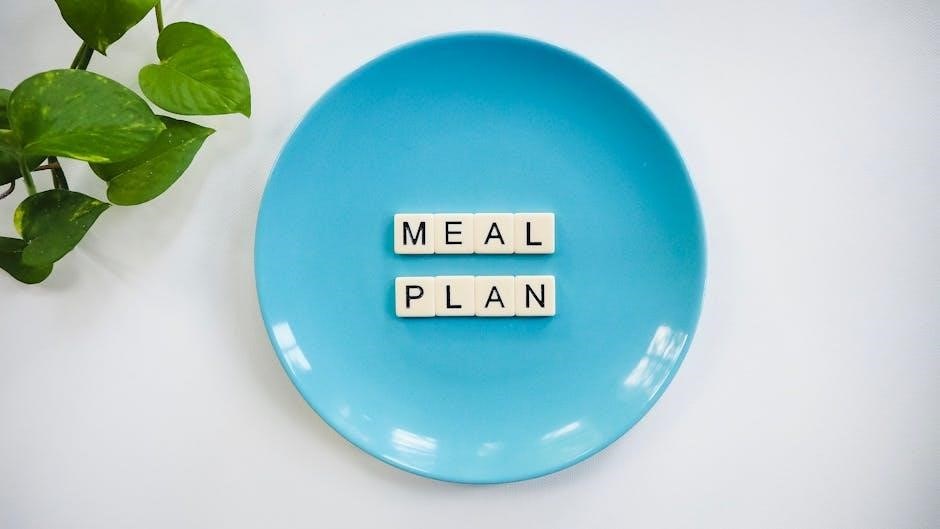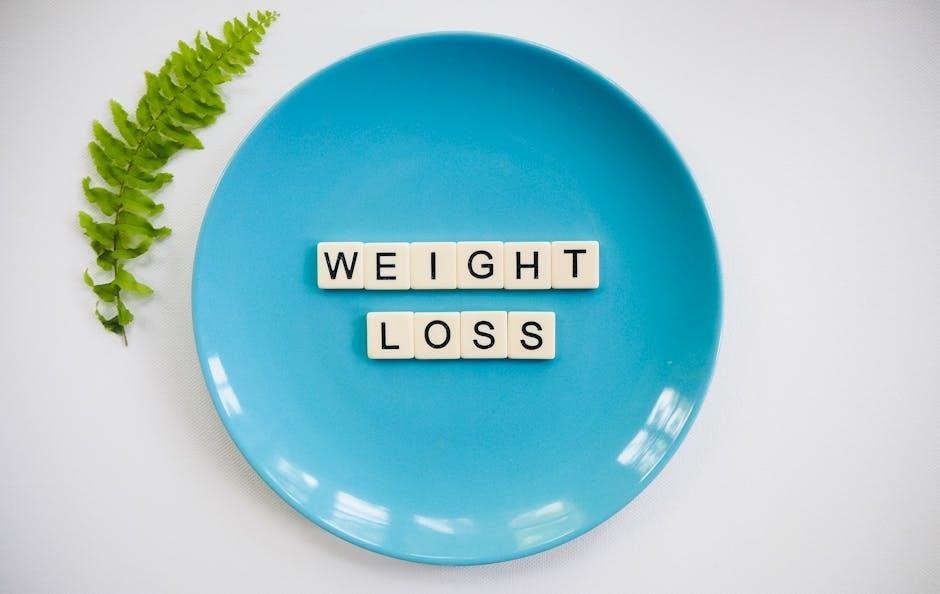
diet plan for muscle gain pdf
A well-structured diet plan is essential for muscle gain, focusing on high-protein intake, caloric surplus, and balanced nutrition. This guide provides a comprehensive approach to help you achieve your muscle-building goals effectively, including meal plans and nutrition strategies.
Importance of Nutrition in Muscle Building
Nutrition plays a vital role in muscle building by providing the necessary fuel for workouts and recovery. A diet rich in protein, carbohydrates, and healthy fats supports muscle repair and growth. Proper hydration and nutrient timing also enhance performance and recovery. Without adequate nutrition, muscle growth is hindered, making it crucial to prioritize a balanced and strategic diet plan tailored to your goals and activity level.
Overview of a Balanced Diet for Muscle Gain
A balanced diet for muscle gain combines protein, carbohydrates, and healthy fats to fuel workouts and recovery. Protein is essential for muscle repair and growth, while carbohydrates provide energy. Healthy fats support hormone production and overall health. The diet should include 5-6 meals daily, spaced every 3-4 hours, with plenty of water to stay hydrated. This structured approach ensures optimal muscle growth and recovery.

Key Principles of a Muscle Gain Diet
A muscle gain diet requires a caloric surplus, high protein intake, balanced macronutrients, proper hydration, and consistent meal timing to support growth and recovery effectively.
Caloric Surplus and Its Role in Muscle Growth
A caloric surplus is crucial for muscle growth, providing the energy needed for muscle repair and hypertrophy. Aim for an additional 250-500 calories daily above maintenance levels, ensuring these calories come from nutrient-dense foods. This surplus supports protein synthesis and muscle recovery, especially when combined with consistent training. Monitoring progress and adjusting intake helps maintain a lean, muscular physique without excess fat gain.
Macronutrient Ratios: Protein, Carbohydrates, and Fats
A balanced macronutrient ratio is vital for muscle gain. Aim for 1.6-2.2g of protein per kilogram of body weight to promote muscle repair and growth. Carbohydrates, such as whole grains and vegetables, provide energy for workouts, while healthy fats support hormone production. A typical ratio is 40% protein, 40% carbs, and 20% fats; Adjusting these ratios based on individual needs optimizes muscle growth and recovery.
Hydration and Its Impact on Muscle Recovery
Hydration is crucial for muscle recovery and growth. Aim to drink at least 3 liters of water daily, as water supports muscle function and nutrient transport. Dehydration can hinder recovery, reducing muscle repair and growth. Incorporate water-rich foods and monitor intake to ensure optimal hydration levels, especially post-workout. Proper hydration enhances muscle recovery and supports overall muscle-building efforts effectively.
Sample 7-Day Meal Plan for Muscle Gain
This structured plan provides balanced, high-protein meals and snacks to fuel muscle growth, ensuring adequate calories and nutrients for optimal gains throughout the week.
Breakfast Options: High-Protein Recipes
Start your day with high-protein breakfasts to fuel muscle growth. Options include oatmeal with nuts, scrambled eggs, Greek yogurt with berries, or protein smoothies. These meals provide essential amino acids and energy for workouts; Incorporate whole grains and healthy fats to maintain balance. Stay hydrated with water or herbal tea to support digestion and recovery. Aim for 30-50 grams of protein at breakfast to kickstart muscle synthesis and energy levels.
Lunch Ideas: Balancing Protein and Carbs
For a muscle-building lunch, combine lean proteins with complex carbs. Grilled chicken breast with quinoa, fish tacos with whole-grain tortillas, or lentil soup with whole wheat bread are excellent options. These meals provide sustained energy and support muscle repair. Aim for 40-60 grams of protein and include healthy fats like avocado or nuts. Pair with a side of steamed vegetables for essential vitamins and minerals to optimize recovery and growth.
Dinner Recipes: Lean Proteins and Complex Carbs
Dinner should focus on lean proteins and complex carbs to fuel muscle recovery. Opt for baked cod with brown rice and steamed broccoli, or lean beef stir-fry with quinoa and mixed vegetables. Vegetarian options like tofu curry with sweet potatoes and spinach are also ideal. Pair meals with a side salad for added fiber and nutrients. Aim for 50-70 grams of protein and complex carbs to support overnight muscle repair and growth.
Snacks for Muscle Recovery and Growth
Snacks play a crucial role in muscle recovery and growth by providing a steady supply of nutrients. Opt for high-protein snacks like Greek yogurt, cottage cheese, or a protein shake. Nuts, seeds, and whole-grain crackers are also excellent choices. Fresh fruits paired with nut butter offer a perfect balance of carbs and protein. Aim to snack every 3-4 hours to maintain muscle synthesis and recovery. Stay hydrated with water or electrolyte-rich beverages to support overall muscle health and growth.
Vegetarian Diet Plan for Muscle Gain
A well-planned vegetarian diet can effectively support muscle gain by focusing on plant-based proteins, legumes, tofu, and quinoa. A 7-day meal plan ensures balanced nutrition for optimal results.
High-Protein Vegetarian Foods
Plant-based proteins like tofu, tempeh, lentils, chickpeas, and quinoa are excellent for muscle gain. These foods provide essential amino acids and nutrients. Legumes, beans, and edamame are also rich in protein and fiber, supporting muscle growth and recovery. Dairy products such as paneer and Greek yogurt are great options for vegetarians, while nuts and seeds like almonds and chia seeds add healthy fats and protein to meals.
Sample Vegetarian Meal Plan
A typical day includes tofu stir-fry for breakfast, quinoa salad with chickpeas for lunch, and lentil curry with brown rice for dinner. Snacks like Greek yogurt, nuts, and protein smoothies keep energy levels high. Paneer tikka, veggie wraps, and edamame are also great options. This plan ensures high protein intake while staying plant-based, supporting muscle growth and recovery. Stay hydrated and adjust portion sizes based on your caloric needs.

Role of Supplements in Muscle Gain
Supplements like protein powder, creatine, and BCAAs support muscle growth and recovery. They enhance workout performance and help meet daily nutrient needs for optimal muscle development.
Protein Powders and Their Benefits
Protein powders are a convenient way to boost daily protein intake, essential for muscle repair and growth. They offer high-quality protein in concentrated forms, making them ideal for post-workout recovery. Options like whey, casein, and plant-based proteins cater to various dietary needs. Regular use helps meet protein goals, supports muscle synthesis, and enhances overall muscle-building efforts when combined with a balanced diet and consistent training.
Other Supplements: Creatine, BCAAs, and Multivitamins
Creatine enhances strength and endurance, while BCAAs aid muscle recovery and reduce soreness. Multivitamins fill nutritional gaps, ensuring optimal health. These supplements complement a structured diet, boosting muscle growth and performance. They are particularly useful when paired with consistent training and proper nutrition, helping to achieve lean muscle goals effectively.
Post-Workout Nutrition for Muscle Recovery
Post-workout nutrition is crucial for muscle recovery and growth. Consuming protein and carbohydrates within the anabolic window (30-60 minutes) helps replenish energy stores and repair muscles efficiently.
Importance of the Anabolic Window
The anabolic window, typically within 30-60 minutes post-exercise, is critical for muscle recovery. During this period, your body absorbs nutrients efficiently, replenishing glycogen and promoting muscle repair. Consuming a mix of protein and carbohydrates helps maximize muscle synthesis and reduces muscle breakdown, essential for gaining lean muscle and optimizing workout results. This timely nutrition strategy supports faster recovery and enhances overall muscle-building efforts significantly.
Best Foods and Shakes for Post-Workout Recovery
Post-workout recovery requires a strategic mix of nutrients to replenish energy stores and support muscle repair. Whey protein shakes are highly effective due to their rapid absorption, often combined with carbohydrates to restore glycogen. Chocolate milk is a popular choice, offering both protein and carbs. Additionally, bananas provide potassium and carbs, while nuts and seeds offer healthy fats and protein. Recovery shakes with creatine or BCAAs can enhance muscle growth and reduce soreness. Timing is crucial, with the anabolic window suggesting nutrient intake within 30-60 minutes post-exercise. Hydration is also key, with coconut water or sports drinks aiding in replenishing lost electrolytes. Balancing macronutrients, with a 2:1 or 3:1 carb-to-protein ratio, can optimize recovery. While fats are less critical immediately post-workout, they remain important for overall nutrition. Personal preferences and convenience play a role in choosing between shakes and whole foods, with cost-effective options like Greek yogurt available. Consistency and individualization of these strategies are vital for effective muscle recovery and growth.

Personalized Nutrition Plans
A personalized nutrition plan tailors calorie and macronutrient intake to individual goals, activity levels, and body composition, ensuring optimal muscle gain and sustainability.
Customizing Your Diet Based on Goals and Needs
Customizing your diet involves tailoring calorie and macronutrient intake to your specific goals, body type, and activity level. For muscle gain, personalization ensures you meet your protein, carb, and fat needs while avoiding plateaus. Factors like age, height, and workout intensity are considered to create a sustainable plan. This approach helps balance lean muscle growth with overall health, ensuring long-term success and adaptability as your goals evolve.
Adjusting Caloric and Macronutrient Intake
Adjusting your caloric and macronutrient intake is crucial for muscle gain. Aim for a caloric surplus, with protein intake at 1.2-2.2g per pound of body weight. Carbohydrates fuel workouts, while healthy fats support hormone production. Tailor these ratios based on your activity level, age, and progress. Regularly monitor and adjust to ensure consistent muscle growth while maintaining overall health and avoiding excess fat gain.

Snacking for Muscle Gain
Snacking supports muscle recovery and growth by providing essential nutrients between meals. Opt for high-protein, healthy options like nuts, yogurt, or fruit to maintain energy levels and muscle repair.
Healthy Snack Options to Support Muscle Growth
Healthy snacks like nuts, seeds, and Greek yogurt provide essential protein and nutrients for muscle repair. Include fruits, protein smoothies, or energy bars to maintain energy levels and support growth. Opt for whole, nutrient-dense foods to avoid empty calories and ensure steady muscle recovery throughout the day.
Timing and Frequency of Snacks
Snacks should be timed to maintain energy levels and support muscle recovery. Aim for 2-3 snacks daily, spaced evenly between meals. Optimal times include pre- and post-workout, as well as mid-morning and afternoon. Pair protein-rich snacks with carbohydrates for sustained energy. Proper timing ensures consistent nutrient flow, promoting muscle growth and preventing muscle breakdown.

Common Mistakes to Avoid
Avoid insufficient caloric intake, overtraining, and neglecting hydration. Skipping meals and poor nutrient balance can hinder progress. Consistency and patience are key to sustainable muscle growth.
Insufficient Caloric Intake
One of the most common mistakes is not consuming enough calories, which is essential for muscle growth. Muscles require energy to repair and grow, and a caloric deficit can lead to muscle loss. Aim for a caloric surplus, ensuring adequate protein, carbohydrates, and fats. Neglecting this can result in fatigue, poor recovery, and limited progress. Calculate your needs accurately and maintain consistency to avoid this pitfall. Proper nutrition planning is key to achieving muscle gain goals effectively.
Overtraining and Under-Recovery
Overtraining without adequate recovery can hinder muscle growth and lead to injury. Muscles need rest to repair and rebuild, so neglecting recovery can result in fatigue and muscle loss. Signs include decreased performance, increased soreness, and mental exhaustion. Incorporating rest days, proper nutrition, and sufficient sleep is crucial. Balancing intense workouts with recovery ensures muscle repair and growth, preventing burnout and supporting long-term progress in your muscle-building journey.

Low-Carb Diets for Muscle Gain
Low-carb diets can support muscle gain by maximizing protein intake and fat utilization. They focus on high-protein, nutrient-rich foods to fuel muscle growth and maintain energy levels effectively.
Keto and Carnivore Diets: Pros and Cons
Keto diets promote fat loss and muscle preservation through high-fat, moderate-protein, and low-carb intake, offering satiety and energy. The Carnivore Diet simplifies meal planning and reduces inflammation but is highly restrictive. Both diets risk nutrient deficiencies and may not be sustainable or suitable for everyone due to strict restrictions and potential health concerns.
High-Protein, Low-Carb Meal Ideas
Grilled chicken or fish with roasted vegetables, egg-based dishes like omelets, and Greek yogurt with nuts are excellent high-protein, low-carb options. These meals support muscle growth while minimizing carb intake, making them ideal for low-carb diets aimed at lean muscle gain. They provide essential nutrients and satiety without excess carbohydrates, aligning with goals for muscle definition and overall health.

Sustainability and Long-Term Success
Consistency is key to long-term muscle gain. A sustainable diet plan involves gradual changes and balance, ensuring steady progress without burnout or deprivation.
Maintaining a Consistent Diet Plan
Consistency is crucial for muscle gain. Plan meals in advance, ensuring regular intake of protein, carbs, and fats. Aim for 6-7 meals daily, spaced evenly, with hydration prioritized. Avoid extreme restrictions and focus on sustainable habits. Track progress and adjust portions as needed. A balanced, long-term approach ensures steady muscle growth without burnout or nutrient deficiencies, supporting overall health and fitness goals effectively.
Staying Motivated and Avoiding Burnout
Motivation is key when following a diet plan for muscle gain. Set realistic goals and celebrate small achievements to maintain drive. Include a variety of nutrient-dense foods to keep meals enjoyable. Avoid overtraining and ensure adequate rest. Track progress through photos or measurements, and seek support from fitness communities. A positive mindset and consistent effort will help prevent burnout and keep you committed to your muscle-building journey long-term.
Consistency and patience are key. A well-structured diet plan, combined with proper training, ensures sustainable muscle growth. Stay committed and celebrate progress for lasting success.
Final Tips for Effective Muscle Gain
Stay consistent with your diet and training to maximize muscle growth. Incorporate a variety of protein sources, complex carbs, and healthy fats. Monitor your progress, adjust caloric intake as needed, and ensure adequate hydration. Recovery is crucial, so prioritize sleep and avoid overtraining. Personalize your plan based on goals and body type for optimal results. Patience and dedication are key to achieving sustainable muscle gain.
Downloadable Resources: PDF Meal Plans and Guides
Access detailed PDF meal plans designed for muscle gain, offering structured guidance for breakfast, lunch, dinner, and snacks. Expert resources like Guru Mann’s 12-week nutrition plan provide tailored calorie and macronutrient breakdowns. These guides are customizable, ensuring a balanced intake of protein, carbs, and fats. Downloadable plans also include tips for hydration and recovery, making it easier to stay consistent and achieve your muscle-building goals effectively.
Related Posts

main eco elite boiler manual
Get the comprehensive Main Eco Elite Boiler Manual for installation, troubleshooting, and maintenance. Your ultimate guide for efficient heating in the UK!

candy washing machine manual pdf
Get your free Candy washing machine manual PDF download instantly! Easy-to-follow guide for maintenance and troubleshooting.

panasonic sd-2500 user manual
Download the Panasonic SD-2500 user manual for your bread maker. Get UK support, troubleshooting, and recipes. Your ultimate guide!